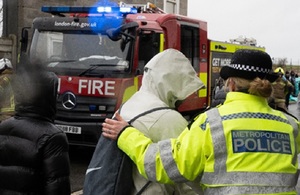Major exercise tests response to terrorist attacks
A large-scale exercise has been taking place over 2 days, to test the response of the emergency services and government to a major terrorist incident.

The Home Office planned and co-ordinated the National Counter-Terrorism Exercise, working closely with partners from:
- British Transport Police
- Metropolitan Police
- North Yorkshire Police
- Counter Terrorism Policing North-East
- London Fire Brigade
- London Ambulance Service
- North Yorkshire Fire and Rescue Service and Yorkshire Ambulance Service
Exercise Spring Resolve aimed to test the collective emergency services response to a series of no-notice violent attacks across multiple regions, effective multi-agency command and control arrangements to stop the attacks, save lives and undertake effective and timely consequence management and recovery.
The exercise formed part of the regular counter-terrorism testing and exercising programme which takes place across the UK. Agencies all set clear exercise objectives that were to be tested, and many of those objectives were linked to the recommendations made following the Manchester Arena Inquiry - Volume 2.
Security Minister, Tom Tugendhat, said:
The first duty of government is to protect the British people. Exercises like Spring Resolve are critical to ensure all agencies and departments are prepared for any type of attack.
I would like to thank all our frontline services for their diligent and brave work to protect and safeguard our country and people in the face of complex threats.
The exercise scenario involved a mixture of live and notional play and included multiple attacks in rapid succession in London, designed to test fast and effective multi-agency response, communication and co-ordination. Attack locations included the transport network and other publicly accessible locations.
The scenario incorporated a further no-notice attack at a publicly accessible location close to York city centre on the second day, again designed to test and exercise effective multi-agency response and recovery arrangements.
The exercise tested communication flows from attack scenes, through strategic command centres and directly into central government, with COBR meetings being held on both days, government Ministers and senior officials also being exercised.
Counter Terrorism Policing’s Senior National Coordinator for Protect and Prepare, Deputy Assistant Commissioner Laurence Taylor said:
We know how vital it is that everyone involved in the response to a terrorist attack is fully prepared so that should the worst happen, together we are able to provide the best possible response.
Ensuring our plans are fit for purpose will ultimately help save lives and testing them regularly is crucial in ensuring police officers and our partners right across the UK understand their roles.
Strategic exercise lead for North Yorkshire Police, Superintendent Jason Dickson said:
This was a welcome opportunity for the emergency services in North Yorkshire to take place in a national CT exercise. It provided an opportunity to test our joint working in dealing with a no-notice violent attack.
We tested the strategic prioritisation and decision-making for the safe and effective deployment of specialist and non-specialist resources to scenes and the early consideration of recovery measures.
This exercise has been planned for more than a year and has taken place a few weeks after the conclusion of the Manchester Arena Inquiry. Volume 2 of this Inquiry recommended emergency responders enhance their interoperability for better effectiveness, and this aim was placed at the heart of Spring Resolve.
The exercise demonstrated how to bring together available information, reconcile potentially differing priorities and make effective decisions together.